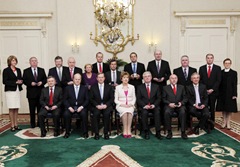The new Government
 As the Fine Gael-Labour coalition begins its task of “mending the pieces of a fractured society”, eolas examines its plans for reform.
As the Fine Gael-Labour coalition begins its task of “mending the pieces of a fractured society”, eolas examines its plans for reform.
“By the end of our term in Government, Ireland will be recognised as a modern, fair, socially inclusive and equal society supported by a productive and prosperous economy,” the new Programme for National Government promises.
There was some controversy over the fairness and inclusivity of Kenny’s choice of Cabinet, particularly the decision to give former teacher Brendan Howlin the important public sector spend and reform portfolio, rather than former accountant Joan Burton. Despite this, there was a sense of a ‘new era’ when the 31st Dáil met on 9 March.
By entering a “covenant” with the Irish people, Kenny said that the Government would “tell people the truth, no matter how unwelcome or difficult that might be.”
Reform
Reform is the buzz word of the 31st Dáil, mainly because, in terms of finance, the Government’s hands are tied by Europe and the IMF and this, in turn, affects national affairs such as health and social welfare. The Government has to give the impression that it will become more accountable to the electorate; therefore its focus will be on reforming the old system. The creation of two new departments and the amalgamation or alteration of seven others reflects the beginning of change.
The Department of Finance will be split into two: Finance and Public Expenditure and Reform. The Department of Health and Children will be split into the Department of Health and the Department of Children. The defence portfolio will be combined with justice, and Enterprise, Trade and Innovation will become Enterprise, Jobs and Innovation.
However, writing in the Irish Times about his first day as a TD, Wexford’s Mick Wallace described Leinster House as “a little state within a state.” He said “there was a sense of detachment from the world [which] plays its part in the disconnect that so many people in the country experience with that same establishment.”
Kenny’s new Cabinet members are predominantly male, over 50 or have previously sat at Cabinet or been leader of their party. However, this does bring experience during this economic crisis. Older ministers include Michael Noonan, 67, a former Justice, Industry, Energy and Health Minister and Ruairí Quinn, 64, former Health Minister. The Taoiseach largely rewarded those who were faithful to him during last year’s leadership heave such as: James Reilly (Health) and Frances Fitzgerald (Children). However, he also conceded positions to Richard Bruton (Enterprise) who instigated the heave and a Bruton supporter, Leo Varadkar (Transport). The two women, Burton and Fitzgerald, were given what are traditionally seen as caring ministries.
The fact that he also appointed 15 ministers of state, despite Fine Gael preparing private members’ legislation to cap that number to 12, while in opposition, has not gone unnoticed. The junior positions largely went to TDs such as Brian Hayes and Jan O’Sullivan who had been disappointed at not getting Cabinet positions.
At the first meeting of the new Cabinet on 8 March, it was agreed that the pay of senior politicians would be cut. The Taoiseach’s salary is being reduced from €214,000 to €200,000, the Tánaiste’s salary from €197,000 to €184,000, ministers’ salaries from €181,000 to €169,000 and junior ministers from €139,000 to €130,000.
Urgent parliamentary reform will be put to a referendum. This will deal with changing the Constitution to account for the abolition of the Seanad, allowing committees to carry out full investigations, and protecting the rights of citizens to communicate in confidence with public representatives. A constitutional convention will also undertake a wider review and report back in one year.
A total of 38 reviews are promised in the Programme for Government. These include: reviews of all bank remuneration schemes, the credit union, universal social charge, spending, universal health insurance, provision for people with disabilities, junior and leaving certs, the Hunt and OECD reports into higher education, local government, the electoral system and the PSO levy on electricity bills.
Former Fine Gael minister Sean Barrett was elected as Ceann Comhairle. He said that TDs could live up to the trust the people had placed in them if they conducted their affairs with “purpose, professionalism, passion and civility.”





